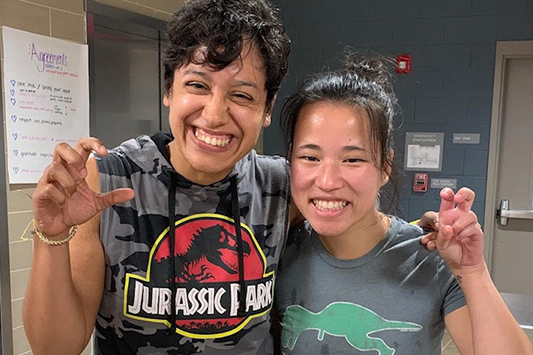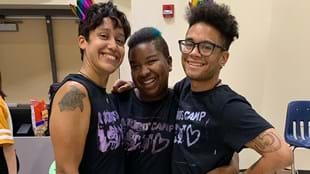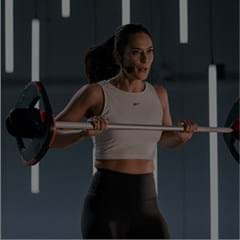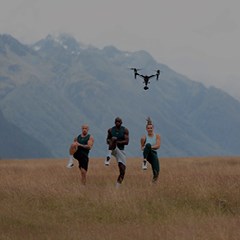During the summer months I help run an LGBTQ+ music summer camp called QORDS: Queer Oriented Radical Days of Summer. QORDS was created to help young queer and trans people express themselves through music and social justice efforts around their community – it’s an amazing concept to be a part of.
My day usually begins with a 5.30am workout: either a bike ride around the western North Carolina (US) hills, or a jog around the university campus. Then it’s time to wake up the campers. There’s always a few slow-to-wake camper cabins, so I start with those first. I then shower and dress, before beginning my second round of wake up calls – corralling the campers to get to breakfast on time. Getting anywhere on time at camp is a bit of a chore and since I’m an early riser, I usually volunteer to get everyone up. Breakfast is eggs any which way, and LOTS of coffee for a full day making music with teens.
As a musician and music educator, my role at the camp is band coach. We break the campers up into bands of three or four and a typical day consists of breakfast, opening circle (morning greeting, singing the camp song, announcements, etc…), then a workshop and band practice. If I’m not engaging with campers during a workshop then I can break to focus on my other responsibilities: running band rehearsal and helping the campers create an original song for the end-of-week showcase.
Lunch is followed by an hour of free time where usually a few campers and counsellors will go play basketball or read outside. After free time, we have the second workshop of the day, plus a second band practice.

I identify as queer and non-binary (they/them pronouns). This identity, along with being Puerto Rican, has had a huge effect on how I experience the world. When I'm at home I teach six group fitness classes a week and I always introduce the class with my name, pronouns, and what I'm about to teach. It’s not the norm, and even though I explain my pronouns are 'they/them' every time I teach, most people in the gym still use she/her pronouns to describe me. We have a long way to go.
I got into QORDS because of a flyer someone put in my friend's workplace, back in 2014. She called me and asked if I knew about this LGBTQ+ music camp. I had just started teaching orchestra in public schools and come out as queer the year before so she thought it would be something I’d be interested in. I started volunteering for the board of the camp the following year.
After dinner we have a full camp workshop or seminar which can cover a range of subjects such as anti-bias and racism, self-care, visual art making, positive body talk, LGBTQ+ music history, slam poetry, the history of the pride flag, or youth organizing and protests. We end the day with an evening activity like queeraoke (like karaoke but with queer kids and adults) open mic night, a dance party or a camp fire. Then the evening bedtime routine starts: rotation of showers, meds, and bed!
The creativity and truth that these teenagers bring to their music makes me cry every summer. As queer and/or trans folks, we often spend our “normal” lives as the “only” queer or trans person in our network: I know I often am – and that’s doubled if you are BIPOC (Black, Indigenous, and people of color) as well. QORDS is like a breath of fresh air. It helped me realize that I don't have to be whatever I was “supposed” to be. Every summer I spend away from my normal life helps me realize the things I no longer want to accept when I return. Working with queer and trans youth – being vulnerable with them in a brave space – creates the most magical and radical camp experience.
WORDS OF WISDOM
Best teaching advice I was given
Tailor your Layer 3 motivational comments to accommodate everyone. I never use someone’s physical appearance or gender to motivate. There will be no “summer bods”, “come on ladies” or “burn off the Christmas cookies” in my classes, because we are more than that and it shames those of us who look different or fall under non-binary umbrellas.
Teaching has taught me this about myself
As a natural introvert, teaching helped me find my voice. More importantly, I now use it to speak up for myself and others. Sometimes it’s still a struggle – I have an inner battle if whether I should correct someone or not (especially about my pronouns). But like every pedal stroke or rep – it gets easier, and I get stronger.
What I wish I’d known as a new Instructor
Eventually, the panic will subside and you’ll just experience the joy of working out with others.
Follow Déb Ramos-Smiley on Instagram








